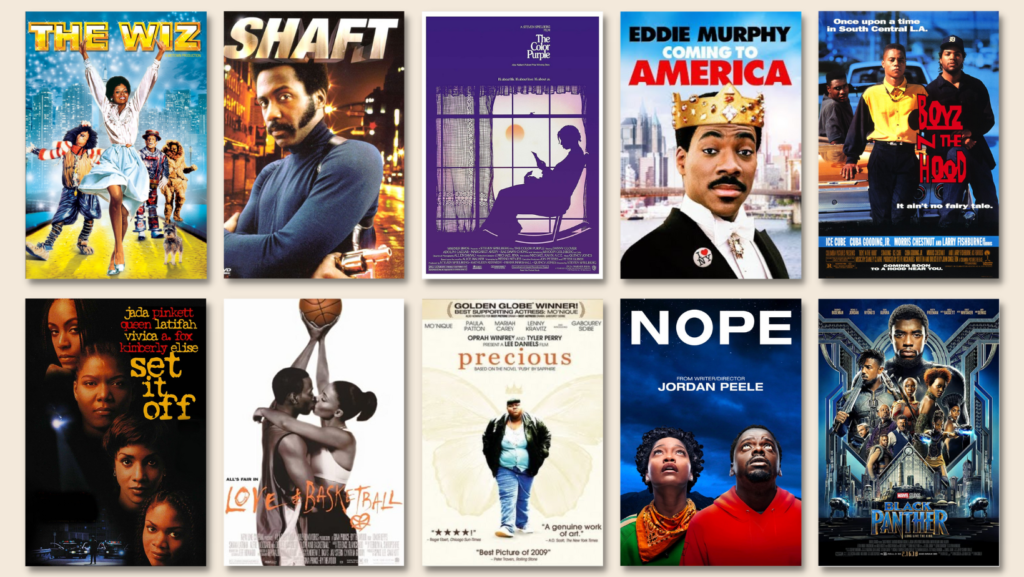Entertainment, Features, Movies / TV
Black Cinema For The Win
Black cinema for the win. Yes, please. There’s something special about the art that is black cinema: the stories, the acting, the swag, the melanin. Over the decades, we got to experience this essence in major blockbusters or cult classic films. You may not know that black cinema has been around since the 1900s. William Foster founded the nation’s first black film production company, The Foster Photoplay Company, in 1910 in Chicago. He wanted to show the depth and humanity of Black people in film. But when it comes to filmmaking, insert Oscar Micheaux. He was a film pioneer, independent filmmaker, and producer who worked as a Pullman Porter before starting his filming career. His first feature film, “The Homesteader,” debuted in 1919. Chicago’s Black Metropolis inspired him to show Black people as fully human.
Impressive right?
Black creatives take control of their own narratives during a time of hate, pain, and civil unrest. White actors used blackface to depict us in stereotypical and negative ways, black actors playing subservient roles to white actors or the portrayal of black actors as unintelligent. Although progress has been slow, we have seen improvements, and we, as a resilient community, continue to push black film forward with incredible movies.
This list was hard to compile because there’s many great movies. Please believe if a movie is not on this list, it’s not because it didn’t help. We wanted to keep the list short and concise. Relish this list of 10 black movies that pushed film forward—broken down by decades.
70s
The 1970s was a significant period for black cinema, also known as blaxploitation. These films were aiming primarily at black audiences and featuring predominantly black casts—the portrayal of black characters was often in stereotypical roles, such as gangsters, drug dealers, and pimps. But it was also a time of great political and social change, with the civil rights movement and the rise of the Black Power movement. These films offered a different perspective on black life and culture. The most famous black cinema films of this period include “Shaft,” “Super Fly,” “Cleopatra Jones,” “Foxy Brown,” and “Blacula.” Here are two stand-out movies.
The Wiz
A musical film that re-imagines the classic story of “The Wizard of Oz,” an all-black cast and an epic soundtrack will have you dancing in your seat. Diana Ross shines as Dorothy, who gets swept away from Harlem by a tornado and lands in a magical world where she meets three characters searching for their heart’s desires: a scarecrow, a tin man, and a lion. Together, they embark on a journey to find the powerful Wiz, who can fulfill their wishes.
Featuring a cast of legends, including Michael Jackson, Nipsey Russell, and Lena Horne.
Shaft
Gordon Parks directs “Shaft,” an action-crime film that was the epitome of cool in its time. Richard Roundtree stars as John Shaft, a private detective in New York City, who takes on the case of investigating the kidnapping of the daughter of a Harlem mobster. His sharp intellect, street smarts, and formidable fighting abilities is the epitome of a tough guy who always delivers results. Don’t be misled by his tough exterior; he has a heart of gold and a legendary soundtrack by Isaac Hayes to back it up.
“Shaft” was a critical and commercial success and is widely regarded as one of the seminal films of the blaxploitation genre.
80s
Gone were the days of blaxploitation movies, as black cinema aimed to showcase more authentic depictions of black life. Although some movies still perpetuated harmful stereotypes, many aimed to challenge them and present a more nuanced and realistic portrayal of black characters and their experiences. There was a significant shift, as black comedy took center stage in films like “Coming To America” and “School Daze.” These movies established black actors and directors as prominent figures in the film industry. Here are two stand-out movies.
The Color Purple
This movie is a forever classic with many catchphrases like “Who dis woman Harpo?” being relevant today. A drama directed by Steven Spielberg and based on the novel of the same name by Alice Walker. Staring Whoopi Goldberg as the protagonist, Celie, a young black woman living in rural Georgia.
The film follows Celie’s journey from a young girl to a confident woman, as she overcomes the obstacles and abuse she faces from her husband and other members of her community. Throughout the film, Celie finds support and friendship from other women. “The Color Purple” is a powerful and emotional film that addresses racial oppression, sexism, abuse, love, friendship, and empowerment.
Coming To America
Get ready to laugh because this movie has an abundance of humor! This comedy classic stars the one and only Eddie Murphy as Prince Akeem Joffer, a prince from the fictional African kingdom of Zamunda who’s tired of being surrounded by women who only want him for his money and title. With memorable performances by Murphy, Arsenio Hall, and James Earl Jones. “Coming to America” was a commercial success and became one of the highest-grossing films of 1988.
90s
During the growth and popularity of black cinema, filmmakers such as Spike Lee, John Singleton, and the Hughes brothers made a significant impact by addressing a wide array of topics in their movies. Moreover, hip-hop culture also gained popularity, with rap music serving as a backdrop in movies like “Boyz N the Hood,” “Menace II Society,” and “Poetic Justice,” solidifying hip-hop’s status as a major cultural force. In addition, Hollywood continued to release big-budget black movies like “Jungle Fever,” “The Bodyguard,” and “Waiting to Exhale.” These films and others helped diversify black cinema and cemented black actors and directors as major players in the film industry Here are two stand-out movies.
Boyz N The Hood
A drama film directed by John Singleton that’s set in South Central Los Angeles. It follows the lives of three young men, Tre Styles (Cuba Gooding Jr.), Ricky Baker (Morris Chestnut), and Doughboy (Ice Cube), as they navigate the challenges and dangers of growing up in a neighborhood plagued by poverty, gang violence, and police brutality. It’s a coming-of-age story that explores themes of friendship, fatherhood, and responsibility.
Set It Off
A crime film directed by F. Gary Gray that follows the lives of four black women, Stony (Jada Pinkett Smith), Cleo (Queen Latifah), Frankie (Vivica A. Fox), and T.T. (Kimberly Elise), Ladies who struggle to make ends meet and are tired of facing oppression and marginalization from society. These women decide to take matters into their own hands and embark on a series of bank robberies to gain financial independence and control over their lives.
2000-2010
This decade marked a revival in black representation and storytelling in film. Significant films featuring diverse themes and experiences of black life, including romantic dramas, comedies, and historical biopics, saw release. Additionally, black women became increasingly visible both in front of and behind the camera with films like “Precious” and “The Help” that showcased the skills of black women actors and filmmakers. Here are two stand-out movies.
Love & Basketball
At its core, “Love & Basketball” is a story about love, friendship, and pursuing dreams. Through the lens of basketball, it explores themes of identity, race, gender, and ambition. It offers a nuanced and emotionally powerful portrayal of two young people navigating the ups and downs of life and love. A film directed by Gina Prince-Bythewood and staring Omar Epps and Sanaa Lathan as Quincy McCall and Monica Wright, two aspiring basketball players who fall in love while growing up together in Los Angeles.
Precious
Based on the Novel ‘Push’ by Sapphire” is a drama film directed by Lee Daniels. Stars Gabourey Sidibe as the titular character, Precious. She’s a 16-year-old black girl struggling with poverty, abuse, and illiteracy. Despite these challenges, she finds the courage to dream of a better life for herself and her children. The film is a powerful and moving portrayal of a young woman’s journey toward self-discovery, empowerment, and healing. Through Precious’ story, the film addresses important and often difficult issues such as poverty, abuse, HIV/AIDS, and the effects of societal marginalization on vulnerable populations.
2010-2020
Black cinema is growing in popularity and influence, with more black filmmakers and actors creating films that reflect the diversity of black life. There’sincreased visibility of black stories and voices, with films like “Da 5 Bloods,” “Ma Rainey’s Black Bottom,” and “The United States vs. Billie Holiday” that offer a nuanced and powerful portrait of black life and experience. Also, the continued growth of streaming platforms, such as Netflix, Amazon Prime, and Disney+, provides new avenues for black filmmakers and actors to reach audiences and tell their stories. Here are two stand-out movies.
Black Panther
A superhero film based on the Marvel Comics character of the same name. Directed by Ryan Coogler, the film stars Chadwick Boseman as T’Challa, the king of Wakanda, a technologically advanced African nation. The film follows T’Challa as he takes on the mantle of the Black Panther and becomes the new king of Wakanda following his father’s death. As he adjusts to his new role, T’Challa must confront challenges at home and abroad, including a powerful adversary threatening to destroy Wakanda and take its valuable resources for himself.
“Black Panther” is not just a superhero film, but also a powerful cultural statement. The film celebrates Africa’s rich history and culture while exploring important themes such as race, identity, and responsibility. The film received widespread critical acclaim and was a huge commercial success. Breaking numerous box office records and becoming one of the highest-grossing films.
Nope
Director Jordan Peele once again proves he is a masterful storyteller with his latest film, Nope. The film stars Daniel Kaluuya as OJ Haywood and Keke Palmer as Emerald Haywood, two siblings who must protect their family’s horse ranch after the death of their father. But when a mysterious, otherworldly creature appears in the skies above their California ranch, they realize their nightmare has only just begun!
Overall
As the years have gone by, black filmmakers have continued contributing to black cinema. We’ve seen opportunities for more black stories told in a less monolithic way, more black directors and writers, and all-black cast and black leads–which is crucial because Hollywood says black leads are not marketable. They are wrong: Black movies are breaking box office records. Yes, there’s still work to be done, but these movies and others prove there’s no denying black filmmaking.



